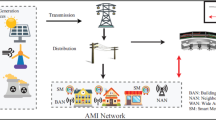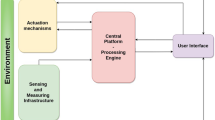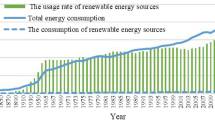Abstract
Most advantages that the smart grid will bring derive from its capability of improving reliability performance and customers’ responsiveness and encouraging greater efficiency decisions by the costumers. Demand side management is, therefore, considered as an integral part of the smart grid and one of the most important methods of energy saving. Accordingly, an innovative decision support and energy management system (DSEMS) for residential applications is proposed in this paper. The DSEMS is represented as a finite state machine and consists of a series of scenarios that may be selected according to the user preferences. The designing and testing methods are described and some simulations results are presented in order to verify its effectiveness both in terms of continuity of electricity supply and energy savings and economics.






Similar content being viewed by others
References
Alvarez C, Gabaldonm A, Molina A (2004) Assessment and simulation of the responsive demand potential in end-user facilities: application to a university customer. IEEE Trans Power Syst 19(2):1223–1231
Bettoni C, Colombo G, Grammatica P, Mauri G, Moneta D (2009) Raccomandazioni per un sistema di risparmio energetico residenziale. Rapporto CESI Ricerca, pp 1–33
Bozchalui MC, Hashmi SA, Hassen H, Cañizares CA, Bhattacharya K (2011) Optimal operation in residential energy hubs in smart grids. IEEE Trans Smart Grid 3(4):1755–1766
Calderaro V, Piccolo A, Siano P (2005) Maximizing DG penetration in distribution networks by means of GA based reconfiguration. In: Proceedings of the 2005 IEEE international conference on future power systems, pp 1–6
Calderaro V, Hadjicostis CN, Piccolo A, Siano P (2011) Failure identification in smart grids based on Petri net modeling. IEEE Trans Ind Electron 58(10):4613–4623
Cecati C, Mokryani G, Siano P, Piccolo A (2010) An Overview on the smart grid concept. In: Proceedings of the 36th annual conference of the IEEE industrial electronics society, IECON 2010, pp 3322–3327
Cecati C, Citro C, Siano P (2011a) Combined operations of renewable energy systems and responsive demand in a smart grid. IEEE Trans Sustain Energy 2(4):468–476
Cecati C, Citro C, Piccolo A, Siano P (2011b) Smart operation of wind turbines and diesel generators according to economic criteria. IEEE Trans Ind Electron 58(10):4514–4525
Chen C.-Y, Tsoul Y.-P, Liao S.-C, Lin C.-T (2009) Implementing the design of smart home and achieving energy conservation. In Proceedings of the 7th IEEE international conference on industrial informatics, pp 273–276
Craig RD, Jaskiel SP (2002) Systematic software testing. Artech House, Norwood
Du P, Lu N (2011) Appliance commitment for household load scheduling. IEEE Trans Smart Grid 2(2):411–419
Gudi N, Wang L, Devabhaktuni V (2010) A simulation platform to demonstrate active demand-side management for household appliances
Gudi N, Wang L, Shekara S (2010) Demand response simulation implementing heuristic optimization for home energy management, pp 1–6
Han J, Choi CS, Park WK, Lee I (2011) Green home energy management system through comparison of energy usage between the same kinds of home appliances In: Proceedings of the 15th IEEE international symposium on consumer electronics (ISCE), pp 1–4
Lee SC, Kim SJ, Kim SH (2011) Demand side management with air conditioner loads based on the queuing system model. IEEE Trans Power Syst 26:661–668
Li J, Chung JY, Xiao J, Hong JW, Boutaba R (2011) On the design and implementation of a home energy management system In: Proceedings of the 6th IEEE international symposium on wireless pervasive computers (ISWPC)
Lien C-H, Bai Y-W, Lin M-B (2007) Remote-controllable power outlet system for home power management. IEEE Trans Consum Electron 53(4):1634–1641
Mohsenian-Rad AH, Leon-Garcia A (2010a) Optimal residential load control with price prediction in real-time electricity pricing environments. IEEE Trans Smart Grid 1:120–133
Mohsenian-Rad H, Wong VWS, Jatskevich J, Schober R (2010b) Optimal and autonomous incentive-based energy consumption scheduling algorithm for smart grid. In: Proceedings of the IEEE innovative smart grid technology, pp 1–6
Mohsenian-Rad AH, Wong VWS, Jatskevich J, Shober R, Leon-Garcia A (2010c) Autonomous demand-side management based on game-theoretic energy consumption scheduling for the future smart grid. IEEE Trans Smart Grid 1:320–331
Molderink A, Bakker V, Bosman M (2010) Management and control of domestic smart grid technology. IEEE Trans Smart Grid, pp 1–10
Molina A, Gabaldòn A, Alvarez C, Fuentes JA (2002) Implementation and assessment of physically based electrical load models: application to direct load control residential programmes. IEE Proc Gener Transm Distib 150:61–66
Myers GJ, Sandler C, Badgett T (2011) The art of software testing. John Wiley, New York
Palensky P (2008) Modeling domestic housing loads for demand response IEEE, pp 2742–2747
Palensky P, Dietrich D (2011) Demand side management: demand response, intelligent energy systems, and smart loads. IEEE Trans Ind Inform 7(3):381–388
Pedrasa M, Spooner E, MacGill I (2009) Improved energy services provision through the intelligent control of distributed energy resources, presented at the 2009 IEEE Bucharest PowerTech Bucharest, Romania
Pedrasa MAA, Spooner TD, MacGill IF (2010) Coordinated scheduling of residential distributed energy resources to optimize smart home energy services. IEEE Trans Smart Grid 1(2):134–143
Piette MA, Watson D, Motegi N, Kiliccote S, Linkugel E (2006) Automated demand response strategies and commissioning commercial building controls. In: Proceedings of the 14th national conference on building commissioning, San Francisco, CA
Ramanathan B, Vittal V (2008) A framework for evaluation of advanced direct load control with minimum disruption. IEEE Trans Power Syst 23(4):1681–1688
Rastegar M (2012) Load commitment in a smart home. Elsevier Appl Energy 96:45–54
Rojchaya S, Konghirun M (2009) Development of energy management and warning system for resident: an energy saving solution. In: Proceedings of the 6th international conference on electrical engineering/electronics, computer, telecommunication and information technology, vol 1, pp 426–429
Roy A, Das S, Basu K (2007) A predictive framework for location-aware resource management in smart homes. IEEE Trans Mobile Comput 6(11):1270–1283
Siano P, Chen P, Chen Z, Piccolo A (2010) Evaluating maximum wind energy exploitation in active distribution networks. IET Gener Transm Distrib 4(5):598–608
Siano P, Cecati C, Yu H, Kolbusz J (2012) Real time operation of smart grids via FCN networks and optimal power flow. IEEE Trans Ind Info 8(4):944–952
Sierra E, Hossian A, Britos P, Rodriguez D, Garcia-Martinez R (2007) Fuzzy control for improving energy management within indoor building environments. In: Proceedings of electronic, robot automotive mechanical conference, pp 412–416
Williams E, Matthews S, Breton M, Brady T (2006) Use of a computer-based system to measure and manage energy consumption in the home. In: Proceedings of the 2006 IEEE international symposium on electronics and the environment, pp 167–172
Author information
Authors and Affiliations
Corresponding author
Rights and permissions
About this article
Cite this article
Siano, P., Graditi, G., Atrigna, M. et al. Designing and testing decision support and energy management systems for smart homes. J Ambient Intell Human Comput 4, 651–661 (2013). https://doi.org/10.1007/s12652-013-0176-9
Received:
Accepted:
Published:
Issue Date:
DOI: https://doi.org/10.1007/s12652-013-0176-9




